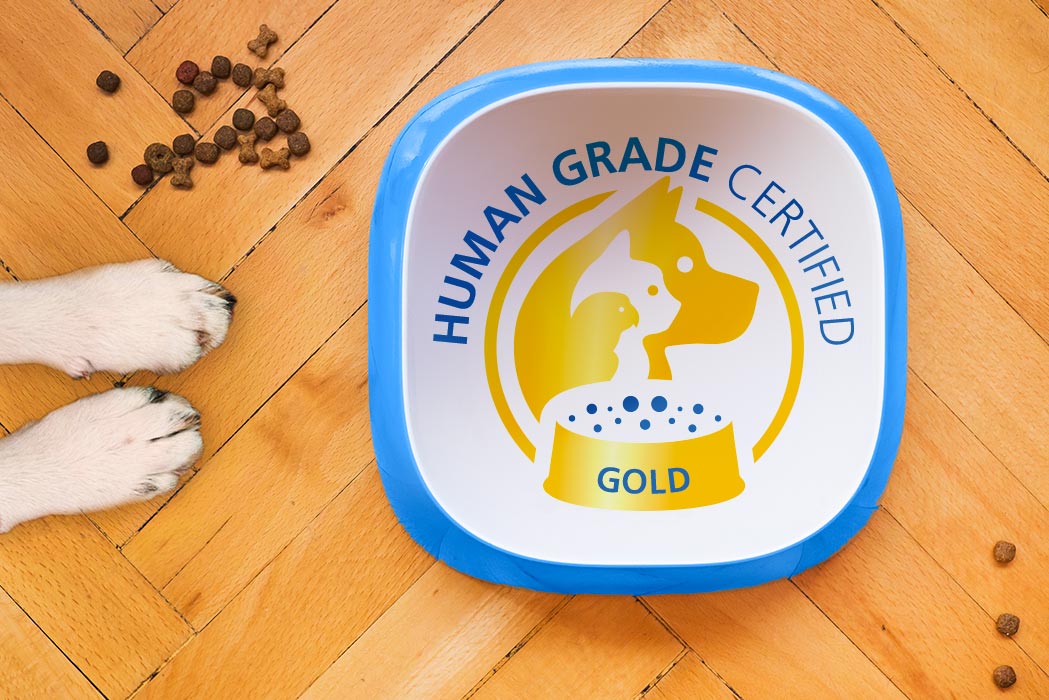
In recent years, “human-grade” pet food has exploded in popularity. This designation refers to pet food that is made from ingredients that meet the standards for human consumption and processed in facilities that follow regulations for human food production.
Many pet foods claim to be human grade, but not all are Human Grade Certified. Here are 10 reasons why that matters.
1. Transparency and Trust
When a pet food product is Human Grade Certified, it shows that the manufacturer is willing to undergo scrutiny and adhere to rigorous standards. This openness fosters a greater level of trust between pet food makers and consumers. Seeing the Human Grade Certification seal on a product assures pet owners that the maker is committed to transparency and accountability in their production process.
2. Enhanced Nutritional Quality
Human Grade Certified pet food is often associated with higher nutritional quality compared to traditional pet food. Ingredients fit for human consumption are generally fresher, less processed, and free from many fillers, additives, and by-products common in conventional pet food. This means pets can get more of the nutrients they need for a healthy life, including proteins, vitamins, and minerals, in forms that their bodies can easily absorb and utilize.
3. Safety and Purity
The standards for human food production are stringent, focusing on cleanliness, handling, and processing. These standards are intended to reduce the risk of contamination by pathogens like Salmonella and E. coli, which are sometimes concerns in the pet food industry.
By conforming to Human Grade Certified standards, manufacturers can offer pet owners peace of mind about what they are feeding their furry family members.
4. Healthier Outcomes for Pets
Feeding pets with human-grade food can lead to healthier outcomes. Pets fed with high-quality, minimally processed foods can have healthier weights, better digestion, more energy, and shinier coats. Moreover, reducing lower-quality ingredients may decrease the risk of allergies, sensitivities, and certain chronic health issues over time.
5. Ethical Considerations
Choosing human-grade pet food can also reflect a more ethical approach to pet nutrition. It suggests a commitment to not compromising the quality of what we feed our pets, similar to the care we take to select our own food. This philosophy supports the welfare of pets by ensuring they are not exposed to inferior or potentially harmful ingredients.
6. Environmental Impact
Human-grade pet food often sources ingredients more responsibly, focusing on sustainability and reducing environmental impact. By utilizing higher-quality, locally sourced ingredients and adhering to more rigorous production standards, these manufacturers can contribute to less waste and lower carbon footprints.
This consideration is increasingly important to pet owners who are conscious of their environmental impact and seek to support brands that prioritize eco-friendly practices.
7. Support for Special Dietary Needs
Pets with specific health issues or dietary restrictions can benefit significantly from human-grade food options. These foods often offer single-source proteins, grain-free options, and other specialized formulations that can help manage health conditions such as food sensitivities, obesity, diabetes, and kidney issues.
8. Psychological Benefits for Pet Owners
Feeding pets human-grade food can also offer feel-good benefits for pet owners. Knowing they are providing the highest quality food can strengthen the emotional bond between pet and owner, fostering a sense of care and responsibility.
This aspect of pet care can enhance the owner’s well-being, as caring for a pet in such a conscientious manner can be incredibly rewarding and affirming.
9. Innovation and Variety
Human-grade pet food brands often lead the way in innovation, offering a variety of formulations, textures, and flavors that go beyond traditional pet food offerings. This variety can be crucial for picky eaters or pets with specific preferences, ensuring they receive the necessary nutrition without compromise.
The continuous innovation in human-grade pet food also means that pets can enjoy a more diverse diet.
10. Economic Impacts
While the cost of human-grade pet food is generally higher than conventional pet food, the investment can potentially lead to lower veterinary bills over the pet’s lifetime. Pets fed a high-quality diet may be less likely to develop diet-related health issues, which can result in significant savings on medical care.

Elevating Pet Health with Human Grade Certification
While human-grade pet food might come at a higher price point, its benefits in terms of nutritional quality, safety, transparency, health outcomes, and ethical considerations make it a compelling choice for pet owners dedicated to providing the best for their pets.
As the pet food industry continues to evolve, the demand for human-grade options is likely to grow, reflecting a broader trend towards more holistic and conscientious pet care practices.
The information provided in this article, including recommendations and insights regarding Human Grade Certified pet food, is intended for educational and informational purposes only. It is important for pet owners to understand that each pet is unique, with specific dietary needs and health considerations. Before making any changes to your pet’s diet or if you have concerns about your pet’s nutritional requirements, we strongly advise consulting with a licensed veterinarian or a pet nutrition expert.

